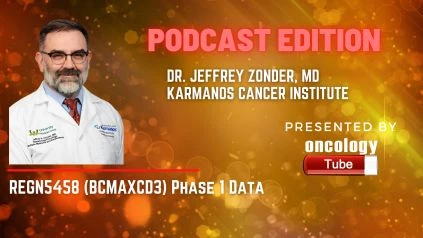Dr. Jeffrey Zonder, MD is a Hematology Specialist in Detroit, Michigan, with over 26 years of expertise. In 1995, he received his medical degree from Wayne State University School Of Medicine. DMC Hutzel Women’s Hospital is where he works. In this video Dr. Zonder discusses the REGN5458 (BCMAXCD3) Phase 1 Data.
https://ash.confex.com/ash/2021/webprogram/Paper144921.html
REGN5458 is a bispecific antibody designed to bind to BCMA on multiple myeloma cells and the CD3 receptor on T-cells in order to bridge them together and activate T-cells to kill the cancer cells. It is now being evaluated as part of the potentially registrational Phase 2 component of the trial, which is set to wrap up enrollment in 2022.
73 patients were treated with REGN5458 dosages ranging from 3-800 mg for up to 21 months at the time of data cutoff, according to results presented at ASH today. Patients had had a median of five prior lines of therapy, with 38 percent (n=28) being penta-refractory and 90 percent (n=66) refractory to the last line.
At the highest dose levels (200-800 mg, n=18/24), the ORR was 75%, and 51% across all enrolled patients (n=37/73). The majority of responses began within the first month of treatment and grew stronger over time. Among all dose groups of responders:
A very good partial response (VGPR) or better was attained by 86 percent (n=32/37) of the participants.
A complete response (CR) was achieved by 43 percent of patients (n=16/37), with 40 percent of evaluable CR patients (n=4/10) having no minimal residual disease (MRD).
There was a 90% chance of being event-free (95 percent CI: 73 percent, 97 percent) at 8 months from the time of response (95 percent CI: 73 percent, 97 percent). At the time of data cutoff, the estimated median response duration had not yet been attained.
Responses occurred quickly, usually within the first month of treatment, and deepened with time; the higher dose groups had a significantly shorter follow-up period at the moment.
Across all dose levels, the safety profile was generally consistent. CRS was documented in 38 percent of patients (n=28), with the majority of instances (n=25) being Grade 1, and no cases exceeding Grade 3. Fatigue (n=33), pyrexia (n=26), nausea (n=24), and anemia (n=23) were the other most common treatment-emergent adverse events (TEAEs). Anemia (n=17), neutropenia (n=16), lymphopenia (n=14), thrombocytopenia (n=10), and pneumonia (n=9) were the most prevalent >Grade 3 TEAEs. There were five deaths in the experiment, all of which were caused by infection; investigators determined that none of the deaths were attributable to the study medicine.
“The highest therapeutic response rates in multiple myeloma are often seen earlier in the disease’s course, when multi-drug regimens are used. The fact that we saw a 75% response rate with higher doses of REGN5458 monotherapy in patients with more advanced cancers is very encouraging “L. Andres Sirulnik, M.D., Ph.D., Senior Vice President, Clinical Development, Hematology at Regeneron, commented on the disease. “This supports the continued development of this class across a varied spectrum of blood malignancies, adding to the growing body of encouraging evidence across our investigational CD3 bispecifics.”
Link to Abstract-
https://ash.confex.com/ash/2021/webprogram/Paper144921.html
REGN5458 is currently in clinical development, and no regulatory authority has completely assessed its safety and efficacy.
The Dose-escalation Trial is a study that examines the effects of increasing the dose of a drug.
REGN5458 (BCMAxCD3) is being studied in an open-label Phase 1/2 dose-escalation experiment in patients with relapsed/refractory multiple myeloma who had had at least three prior lines of therapy or were double refractory. Protease inhibitors, immunomodulatory medicines, and CD38 antibody therapies had all been used previously on all of the patients.
The primary goals of the Phase 1 trial are REGN5458’s safety, tolerability, and dose-limiting toxicities, with effectiveness as a secondary outcome. REGN5458’s anti-tumor efficacy and safety will be evaluated further in Phase 2. Please contact us (clinicaltrials@regeneron.com, +1 844 734 6643) or visit our clinical trial website if you have any questions about this trial.

